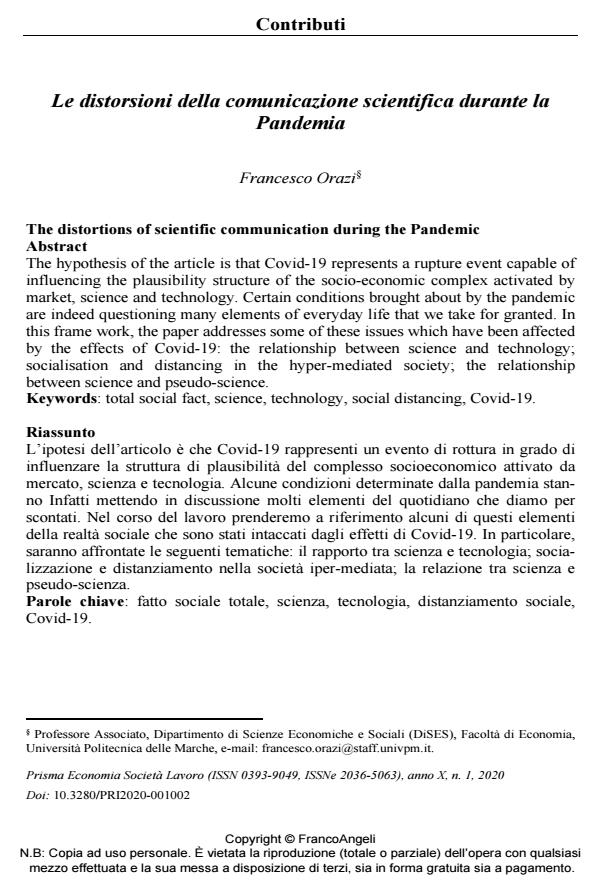Le distorsioni della comunicazione scientifica durante la Pandemia
Titolo Rivista PRISMA Economia - Società - Lavoro
Autori/Curatori Francesco Orazi
Anno di pubblicazione 2021 Fascicolo 2020/1
Lingua Italiano Numero pagine 16 P. 10-25 Dimensione file 216 KB
DOI 10.3280/PRI2020-001002
Il DOI è il codice a barre della proprietà intellettuale: per saperne di più
clicca qui
Qui sotto puoi vedere in anteprima la prima pagina di questo articolo.
Se questo articolo ti interessa, lo puoi acquistare (e scaricare in formato pdf) seguendo le facili indicazioni per acquistare il download credit. Acquista Download Credits per scaricare questo Articolo in formato PDF

FrancoAngeli è membro della Publishers International Linking Association, Inc (PILA), associazione indipendente e non profit per facilitare (attraverso i servizi tecnologici implementati da CrossRef.org) l’accesso degli studiosi ai contenuti digitali nelle pubblicazioni professionali e scientifiche.
L’ipotesi dell’articolo è che Covid-19 rappresenti un evento di rottura in grado di influenzare la struttura di plausibilità del complesso socioeconomico attivato da mercato, scienza e tecnologia. Alcune condizioni determinate dalla pandemia stanno Infatti mettendo in discussione molti elementi del quotidiano che diamo per scontati. Nel corso del lavoro prenderemo a riferimento alcuni di questi ele-menti della realtà sociale che sono stati intaccati dagli effetti di Covid-19. In parti-colare, saranno affrontate le seguenti tematiche: il rapporto tra scienza e tecnolo-gia; socializzazione e distanziamento nella società iper-mediata; la relazione tra scienza e pseudo-scienza.
Parole chiave:fatto sociale totale, scienza, tecnologia, distanziamento sociale, Covid-19.
- Intersoggettività interrotta e salute mentale di bambini e adolescenti durante e dopo il Covid-19: i risultati di una ricerca Davide Lucantoni, Francesco Orazi, Federico Sofritti, in PRISMA Economia - Società - Lavoro 1/2023 pp.11
DOI: 10.3280/PRI2022-001002 - Mental well-being of children and adolescents during COVID-19: evidence from the Italian context and possible future developments Francesco Orazi, Federico Sofritti, Davide Lucantoni, in Frontiers in Sociology 1387030/2024
DOI: 10.3389/fsoc.2024.1387030
Francesco Orazi, Le distorsioni della comunicazione scientifica durante la Pandemia in "PRISMA Economia - Società - Lavoro" 1/2020, pp 10-25, DOI: 10.3280/PRI2020-001002